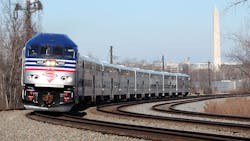PTC fully operational on VRE
Virginia Railway Express (VRE), which operates the 12th largest commuter rail service in the U.S., has positive train control (PTC) fully operational on all of its trains. VRE CEO Doug Allen made the announcement at an April 12 meeting of the VRE Operations Board.
VRE said the safety milestone was achieved April 11, 2019, when each of VRE’s 32 inbound and outbound trains on the Fredericksburg and Manassas lines ran under PTC operation.
“Safety is always our top priority at VRE,” said Allen. “The implementation of PTC takes system safety to the next level and continues our commitment to providing the safest environment for riders, railroad workers and the general public.”
VRE was responsible for installing PTC technology on its 20 locomotives and 21 cab control cars, training employees and integrating a back-office system. Close coordination was required with its host freight railroads, CSX and Norfolk Southern, to place compatible equipment throughout their systems, as well as on the 90 miles of track where VRE operates.
The federally-mandated safety overlay system is estimated to cost railroads nationwide more than $14 billion. VRE expects PTC implementation to cost it $15 million.
All railroads required to implement PTC had until Dec. 31, 2018 to meet several statutory requirements to qualify for an alternative schedule to have PTC fully implemented by Dec. 31, 2020. All railroads met the 2018 requirements, but with only four of 41 railroads had PTC fully operational by the end of 2018. However, since the start of 2019, North County Transit District in southern California and Sound Transit's Sounder trains in Washington state are both fully operational under PTC.
About the Author

Mischa Wanek-Libman
Group Editorial Director
Mischa Wanek-Libman is director of communications with Transdev North America. She has more than 20 years of experience working in the transportation industry covering construction projects, engineering challenges, transit and rail operations and best practices.
Wanek-Libman has held top editorial positions at freight rail and public transportation business-to-business publications including as editor-in-chief and editorial director of Mass Transit from 2018-2024. She has been recognized for editorial excellence through her individual work, as well as for collaborative content.
She is an active member of the American Public Transportation Association's Marketing and Communications Committee and served 14 years as a Board Observer on the National Railroad Construction and Maintenance Association (NRC) Board of Directors.
She is a graduate of Drake University in Des Moines, Iowa, where she earned a Bachelor of Arts degree in Journalism and Mass Communication.
